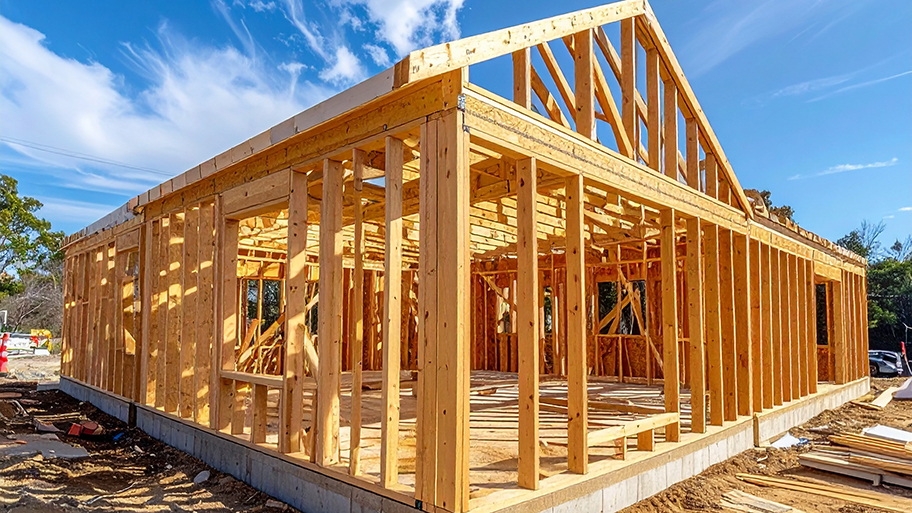
Home elevator costs depend on the size and type of lift, if it needs retrofitting, and the number of floors. Our guide outlines all residential elevator costs.
Own your construction project and save money


A general contractor charges between 10% and 20% of the job total to oversee a construction project from start to finish.
You can save money by acting as your own general contractor, though it can be time-consuming and stressful.
Proper preparation and thorough research can help set you up for success.
If you’re not comfortable in the role of general contractor, hiring a pro is worth the money.
Popular home improvement projects like bathroom or kitchen remodeling can give your home a much-needed boost—but these projects come at a high cost. A bathroom remodel costs an average of $12,110, while a kitchen remodel costs around $23,960. A percentage of that budget goes toward a general contractor, so you might decide to do this job yourself to save money. Here’s what you need to know about being your own general contractor.
A local general contractor is a construction professional who manages all aspects of a construction project. This includes the following tasks:
Tracking the budget
Hiring and overseeing subcontractors
Obtaining the right tools and materials
Securing permits
Keeping the project on schedule
Ensuring safety and compliance
The cost to hire a general contractor to oversee a project falls anywhere from $250 to $58,000, or an average of $4,000. General contractors charge between 10% and 20% of the job total, so your actual cost will depend on the scope of your construction project. Acting as your own general contractor for a construction project can certainly save you money. However, it can also be stressful and time-consuming, and you risk making costly mistakes if you don’t have prior experience in this role.
If you’re ready to take on the challenge of being your own general contractor, this checklist can help.

As you prepare to act as your own general contractor, you’ll need to do some research and initial legwork to ensure the project will run smoothly and be successful.
Understand the role: Before taking on a general contractor position, ensure you understand the role’s requirements and are comfortable taking them on yourself.
Understand the project scope: Even small projects can be more work than expected. Review all aspects of the project and ask whether you’d be better off paying for a professional to manage everything.
Research building codes and regulations: General contractors know local building codes and regulations by heart, so the project is less likely to have issues in these areas. Before acting as your own general contractor, familiarize yourself with your local codes.
Design your project: Before you start building, you’ll need a blueprint. Unless you have professional experience, it’s best to hire an architect to draw up the design.
Make a budget and secure financing: Make a budget, accounting for foreseen and unforeseen expenses. If you’re taking out a loan to finance the construction project, check that your lender will allow you to act as the general contractor.
Get the required permits: Obtain permits from your local municipality. Failure to obtain the proper permits can result in significant delays—and you might even be required to start the project over.
Hire subcontractors: Finding the right subcontractors for your project is essential—especially if it involves specialized work like electrical, plumbing, or HVAC. Request quotes from each subcontractor and sign a contract outlining the project's expectations and the subcontractor's responsibilities.
Obtain materials and tools: List the materials and tools you’ll need to complete the project. Your subcontractors can help ensure your list is accurate. Once you’ve made your list, start shopping for supplies so you’re ready to begin your project.
After successfully planning the project, making a budget, and hiring subcontractors, it’s time to start work. Here are your typical responsibilities as a general contractor during the project.
Manage the site: It’s your job to ensure everything is going according to plan. This requires daily check-ins with subcontractors to keep the project on track, verify that each subcontractor has the correct materials, and resolve any disputes during the project. If the subcontractors you hired aren’t performing satisfactory work, you’ll need to find replacements.
Inspect the work: At each stage of the construction project, you’ll need to inspect the work to ensure it’s been completed according to the plan. If you don’t regularly inspect the work, you risk letting errors slip by unnoticed, which can devastate the project’s timeline and budget.

Once the project is complete, the general contractor must perform a thorough inspection to check that the work has been completed correctly and that everything is up to code.
Walk-through: Check that all tasks are finished and meet the project requirements. If you notice any unfinished tasks, contact the subcontractor in charge so they can complete them as promised.
Final clean-up: Once you’re satisfied that the project is finished, it’s time to clean up so you can enjoy the fruits of your labor.
If you’re ready to try being your own general contractor for an upcoming construction project, the following tips can help you be successful.
Vet all contractors and subcontractors thoroughly and check that they are licensed and insured.
Require all subcontractors to sign an agreement that states the work they’re being hired to do, cost, project timeline, material and permit requirements, and consequences for breaking the agreement.
Keep an open line of communication with subcontractors to keep the project moving.
Plan for unexpected delays, like late materials, bad weather, or unreliable subcontractors.
Keep your paperwork and receipts organized, and consider using a project management software program to keep everything easily reachable.
Ensure the construction site is safe and all subcontractors follow the proper safety protocols to avoid injury.
Consider getting supplemental insurance coverage to cover you and your property during the construction project.
From average costs to expert advice, get all the answers you need to get your job done.

Home elevator costs depend on the size and type of lift, if it needs retrofitting, and the number of floors. Our guide outlines all residential elevator costs.

The cost to frame a house can vary depending on the size of your home, the structure you’re building, and your materials. Keep reading to learn how much framing your house might cost.

When your home project requires a professional at the helm, how much are construction management fees, and how do they determine their rate? Let's break it down.

Discover the 6 main types of home elevators, from hydraulic systems to machine room-less options, as well as their features, benefits, and ideal uses.

Your metal stud framing cost depends on multiple factors, including the project's size, the gauge of steel, and labor prices in your location, plus add-ons.

When planning a home renovation or remodel, asking your contractor to reduce the price of the job is never an easy task. But negotiation is possible! Read these tips for negotiating with a contractor the right (and effective) way.